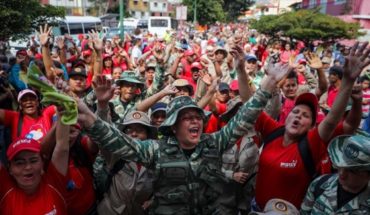President Gabriel Boric spoke of a “different” regulation of the forestry industry, as a result of the responsibility that companies would have, mainly due to monoculture, within the framework of the Government’s deployment for the implementation of early aid measures and announcements on reconstruction in the affected areas, in the face of the series of accidents that scorch the center-south of the country.
The President said that this is how he raised it with parliamentarians and mayors, “we have to have a longer-term discussion regarding the forestry industry, a different regulation,” he said, from Quillón, in the Ñuble Region. “Today we are all committed together to combat the emergency, public and private sector, but there has to be a regulation that allows all the preventions to be established,” said Gabriel Boric.
According to the balance delivered by President Boric himself, “weather conditions will be increasingly adverse”. But, “we have to generate everything in our power to prevent and reduce the level of risk, and in that, the private and public sectors have to work together,” he reiterated.
Who also referred to the issue was the Minister of Agriculture, Esteban Valenzuela, addressing forestry responsibility in the development of forest fires. “We have to do a structural redesign and, as I say, leave the perinola,” the secretary of state said in a conversation with ADN radio.
“I directed the Center for Regional Studies at the University of Concepción, in the middle of the forest area, I know all the reports that came out after 2017 regarding changes, agroforestry transitions, and yes, little action has been taken,” added the head of the Ministry of Agriculture (Minagri) and presidential liaison in the Ñuble Region.
Minister Valenzuela, finally, said that to carry out this agricultural redesign and prevent forest fires, “the important thing is to get out of the institutional, business, and pamphletarian entrenchment.” For example, he said, “there are people who say that there is not a kilometer of firebreaks and for what, to have dry grass, because the cattle base was lost than in the center-south zone, unlike Los Ríos or Los Lagos, which are the regions with fewer fires, precisely because of the existence of green pasture and combination of mixed forest conservation.”
“Our commitment, which is what President Boric asks us, is to act and in March we will see the project, which is already advanced, to improve regulation, certainly with the actors, to seek an agreement and make this sustainable,” said the head of Minagri.
State aid for those affected by forest fires
In the same context, an important aid for small peasant family agriculture affected by forest fires, made today Minister Valenzuela, together with the Association of Rural Municipalities (AMUR) and the Rodeo Federation of Chile (FEROCHI). “We are very happy, collaboration continues to multiply with the Ñuble region and with all the regions that are affected. We are here, in a first stage, contributing with bales, water containers for farmers who have had a hard time,” the minister emphasized.
This donation consists of 5,000 bales of fodder; 20 5,000-litre ponds; 2 pools of 7,259 lts; hours of machinery and oil to help the most affected communes of the Ñuble Region and a commitment to collaborate the following weeks of the accidents, according to the diagnosis made by the authorities to assist in the recovery work of the fields.
For his part, the president of AMUR and mayor of Pirque, Jaime Escudero, thanked the commitment of the rural municipalities since “since we talked about the emergency, all the municipal councils made an additional contribution, which today together with the Rodeo Federation we were able to bring more than 5,000 bales, several swimming pools, water ponds, which is what our collaborators told us. We wanted to focus on Ñuble and we are certainly worried about the other regions, but we try to contain it, supporting emotionally. It’s really dramatic for us who were in Santiago, to arrive here and see the reality.
As Escudero explained, the idea is to continue contributing together with the Rodeo Federation. “We have all been cooperating with great enthusiasm and enthusiasm in aid of our neighbors here in the Ñuble Region. The rural world is not going to leave them alone,” he said.
Green brigades
On the occasion, Valenzuela also took advantage of relieving the agreement reached with the Ministry of Education for the creation of the Green Brigades. “We have reached a strategic agreement between Agriculture and the Ministry of Education, because many children send us letters about how we can help fight fires and we have agreed to create the Green Youth Brigades for Environmental Protection, where the importance of fire prevention is taught, but where there is also co-responsibility,” Valenzuela explained.
In turn, the Minister of Education, Marco Antonio Ávila, said that “although we are attending to the emergency, we have seen that this must be projected. Probably the climate crisis is not going to go down and what we have to do is anticipate and part of those preventive tasks are these green youth brigades that we want to implement from next year, with preparation for the knowledge of rurality, the knowledge of what will unfortunately affect us in the coming decades about global warming, which are these fires that we have unfortunately seen these days.”
Avila added: “we are going to expand, we are going to make a formal presentation to the President and hopefully also incorporate Minister Maisa Rojas for the more specific knowledge of those species that we have to take care of.”
U.S. Ambassador Meeting
During the day, Minister Valenzuela also met with the U.S. ambassador to Chile, Bernadette Meehan, with whom he discussed the scope of the aid that the United States is providing to combat forest fires. “We are grateful that the U.S. ambassador has come to the Ñuble region and then goes to the Biobío region to make a contribution in this process of accompaniment to peasants and everyone in the agricultural sector,”
Finally, Ambassador Meehan pointed out that “this week I have been in contact every day with Minister Urrejola, I have also spoken with Minister Tohá and the Embassy is in contact every day with CONAF, with officers here in the region, with the firefighters and with Senapred. And I am authorized to give more money to buy tools and equipment to fight the fires, also humanitarian assistance for the community and communities that are suffering from this crisis.”
Follow us on





